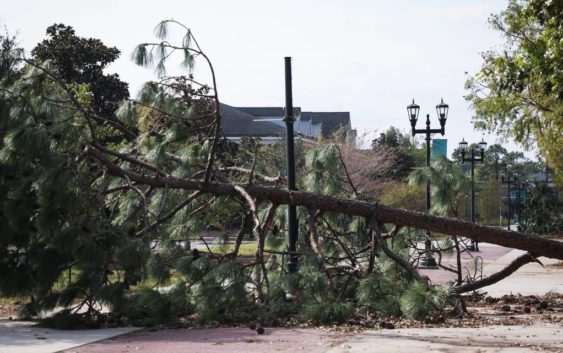- Teen thrown from home during EF-2 tornado takes first steps in ICU — with a surprise message from Shaq
- Tennessee restores 46 out of 49 roads post-Hurricane Helene
- Duke Energy boosts storm readiness with technology ahead of hurricane season
- Acting head of FEMA told staff he was previously unaware the US has a hurricane season; DHS said he was joking
- What Texas lawmakers did after the state’s largest wildfire
After hurricane, UNCW faces extensive rebuilding at hefty price tag

Hurricane Florence caused about $140 million in damage at UNC Wilmington, and university leaders say they hope to accomplish repairs with a combination of insurance claims, state funding and help from FEMA.
The big-ticket item was Dobo Hall, the large science building that lost part of its roof and was ruined by 25-35 inches of water inside. It will have to be almost gutted and rebuilt at a cost of about $60 million, said UNCW Chancellor Zito Sartarelli, who called the Dobo damage “just a nightmare.” Insurance is expected to cover $32 million of the cost of the repair, which could take two years.
The rest will come from the state. In October, in a special session, the legislature allocated $30 million to the UNC System and three damaged campuses, including UNC Pembroke and Fayetteville State. UNCW got the bulk of it — $27 million.
Part of the cost of the Dobo repair will be reinforcing the structure to withstand a future Category 3 or Category 4 hurricane, Sartarelli said.
“We want to make sure there’s a roof that can withstand 130 to 150 miles an hour,” he said.
In the meantime, students have spread out to other facilities for science instruction. By January, modular units will be set up for science labs and classrooms, and by next fall, a temporary metal building will be erected while the Dobo reconstruction is under way, Sartarelli said. FEMA is helping the university put up the temporary facilities.
Sartarelli said insurance will cover $80 million to $100 million in damage at the university. FEMA will kick in a little for debris removal and other expenses.
The university also lost 13 apartment buildings on campus to water damage. Attempts to clean them and make them safe for students didn’t work, Sartarelli said.
Five of the buildings had been on schedule for demolition anyway. Now, all 13 will be torn down, to make way for a new complex with 1,800 beds to be built through a partnership with private companies that will build a four-building housing development on UNCW land the university leases for the $121 million project. Construction will begin in January.
For now, students are tripling and quadrupling up in their dormitories, or staying in nearby hotels or apartment complexes. Next year, UNCW will be able to accommodate 400 fewer students on campus, Sartarelli said, while the new housing is being built. That is likely to mean more juniors and seniors will live off campus.
UNCW students lost four weeks of the semester before and after the hurricane. The university had to squeeze 15 weeks of instruction into 11, by canceling fall break and some reading days, lengthening classes and getting a waiver for the rest.
Sartarelli said he would ask the legislature for another $13 million in November with hopes of being able to repair and strengthen some of the older roofs that were damaged.
“If for whatever reason we end up using less than whatever we get from the state government, we have to return it,” he said.
Miles Lackey, vice chancellor for business affairs at UNCW, said “hardening the infrastructure” will protect the campus from future storms.
“We’re only a mile from the Atlantic Ocean,” he said. “We have a lot of our roofing systems that are only rated at 90 miles an hour.”
Besides the $30 million for UNC system repairs after Florence, the legislature also appropriated $2 million in scholarship grants for students affected by the hurricane. The grants are in amounts of up to $1,250.
The money will be allocated to students by the individual campuses.
“Hopefully we’ll have some wonderful success stories in helping those students,” said Kimberly van Noort, senior vice president for academic affairs and chief academic officer of the UNC System.
UNC Board of Governors member Temple Sloan added: “The legislature stepped up in a big way and helped the UNC system here in a difficult time.”
Jane Stancill: 919-829-4559; @janestancill